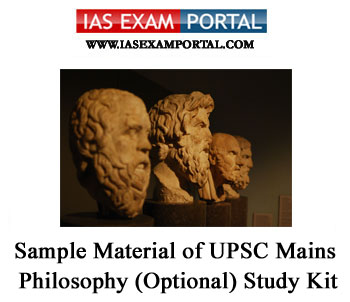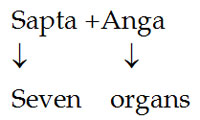(Sample Material) UPSC Mains Philosophy (Optional) Study Kit "Socio Political Philosophy (Kautilya (Arthashastra) 3rd Country B.C.)"

Sample Material of UPSC Mains Philosophy (Optional) Study Kit
Topic: Socio Political Philosophy (Kautilya (Arthashastra) 3rd Country B.C.)
Artha — a piece of land
Sovereignty is a modern theory therefore it is very difficult to discuss a theory of sovereignty in Arthasastra. There are two opinions on this question. According to A.S. Altekar there is no theory of sovereignty in Arthasastra but according to P.V. Kane, through the word sovereignty is short note on saptarga state missing in Arthasastra but the idea of supreme power can be seen there Kautilya has formulated the theory of “Saptanga state” which is like the modern sovereign state like the sovereign of Austin and Bodin the Ruler or swami is also sovereign.

Saptanga state means a state consisting of seven organs swami or the ruler Amatya or the officials, Janapada means land or territory, Durga or capital city with fort, Kosa or treasury, Danda or Army and last is the Mitra or friend.
Click Here for UPSC Mains Philosophy Study Material
In saptanga state, sovereignty is a state is in swami or the ruler. Various stance in the Arthasastra show that swami was like a modern sovereign. In Arthasastra swami has been described as “Dharmapravarttak” which means law enforcer. This shows the supreme legal power of the sovereign. In Arthasastra King has also been described as “Kutasthaniya” which means centre of political. This also makes swami the sovereign chapter 6 of Arthasastra declares that king is the state which also suggests a supreme status of swami Arthasastra also maintains that in certain situations, state may capture the wealth and resource of religious institutions for example when the survival of the state is at stake on this point, Kautilya may be compared with modern philosopher Machiave who said that church is subordinate and state is supreme. But in Arthasastra there are certain limitations on swami,
1) “Dharma”— Swami can implement Dharm not change it eg varna
system.
2) Council of Ministers—Acts as the adviser.
3) According to A.S. Altekar, the ideal of ruler in Arthasastra is the ideal of
welfarist ruler who is concerned with the welfare of his subjects. There is
strict daily routine for the monarch swami is expected to possess the knowledge
of administration, politics, philosophy. He should be of noble character such
ruler cannot be despotic.
Criticisms
1) No systematic theory of sovereignty in Arthasastra like Bodin or Austin but the idea of Sovereignty as supreme power exists there.
Contempt Relevance of Sovereignty
Why irrelevant?
Continuing Relevance
Crisis of Irrelevance
i) International organization UN, IMF, world Bank
ii) International treaties.
iii) Global issues— In the era of globalisation there are certain new issues
which are global in nature like the issue of environment, international
terrorism, AIDS as inter nation. Epidimic on which global strategy is needed and
there issue therefore no state can have separate policies on these policies on
these issues e.g.—global warming.
iv) Organization like WTO in the era of globalization have adversely affected
the decision making powers of the state.
v) In 21st century growing significance of regional economic Blocks has also
limited the decision making power of the state.
Continuing Relevance
1) It a particular state is unable to take a particular decision at a particular moment of time then it doesn’t mean the collapse of the notion of sovereignty because some other state might betaking independent decision at the same time.
2) Participation in world economic system for taking the membership of regional economic block or any international organization depends upon the free will of the state. Therefore if the state obeys the dictates of these organization then. This is because state has voluntarily accepted to obey the commands. Therefore in a way it is also the expression of sovereignty of the state.
3) Supremacy of modern state is also reflected in the crucial power of the state award capital punishment to individual. In this way state controls the most fundamental aspect of individual’s life i.e. the question of life and death.
As a logical theory it is still relevant and there is no logical contradiction. But a for as practical exercise is concerned there are many limitations on the state.
Q: Write critical notes on Kautilya in sovereignty.
Ararchism = No Political Authority
Individual and the state
Right, Dutics and the state
State —Individual
(Authority) (Liberty)
The relationship between the statc and Individual deals with this question that why the individual should obey the state or whether state is useful for individual or not. There are four viewpoints regarding this relationship.
i) State is an unnecessary evil— (Gandhi, Anarchism, Prodha, Tolstoy) and
Marxism.
ii) State is necessary evil—negative liberals and libertarianism.
iii) State is a positive good—Positive liberalism and Democratic socialism.
iv) State is a moral naturel organization—Idealism, Facism, Nazism.
1. According to first view, state is neither good nor needed for the individual primarily Anarchism supports this view.
Marxism also treats state as a class instrument and in the ideal society of Marxism, there is no state According to this viewpoints no relationship is possible between the state and individual, state is completely worthless for the individual.
Criticisms
i) This viewpoint only looks at the darker side of state.
ii) It is Utopian because it believes that states society will come into
existence someday.
iii) They have ignore the evil part of human nature.
2. State as necessary evil— According to this viewpoints state is bad for the individual because it curtails the freedom of individual but still it is necessary because in the absence of state social life is not possible stateless mans. Anarchy and chaos therefore according to there state should be a limited or police state, then only its existence is Justified. Therefore according to this viewpoint only limited and conditional relationship between. State and individual support state when it is a limited state.
Criticisms
i) This viewpoint also takes only the negative aspect of state.
ii) They also define liberty in negative sense which is not sufficient.
3. State as s positive Good— According to this viewpoint state exists for welfare of the individual because
(a) state creates conditions for the enjoyment of liberty.
(b) State brings social Justice in the society
(c) State also brings equality in the society.
Therefore this view believes that a positive relationship is possible between the individual and state on the one hand state works for betterment of individual on the other hand, individual also contributes to the strengthening of state because individual voluntarily accepts the authority of the state according to Laski, Moral adequacy is the basis of state According to Green state hinders the hindrances on the way to good life. Therefore a positive relationship is possible in which state is a possible in which state is a positive actor for individual and individual is an active constituent of the state.
Criticisms: this viewpoint may lead to increase in the powers of the state, which means mercase in the power of bureaucracy.
4. State as Moral natural organization— According to this view state is everything and there approaches considered state as a means but this approach makes state an end in itself. They considered state as a moral natural organization. Moral organization means in the state only individual can secure freedom. It is natural because human by nature want to live under a political authority. According to Plato, state is “individual writ large” According to Hegel state is the “actuality of concrete freedom” He believes in absolute idealism, according to this idea which he also describes as freedom is abstract in the beginning, to become concrete it starts a journey. This Journey continues in all walks of life when this journey of idea or freedom takes place in the realm of development of social institution, then family is the thesis civil society is the antithesis and state is synthesis.
Therefore in the state freedom becomes concrete.
Dialectical idealism— Idea is ultimate reality
Practical Implications— the practical implication of this view is that state becomes end. In Hegal’s own world, “State is the march of god on Earth.” Therefore state is not accountable to the individual. Whatever state does is right. Individual can become free only if it obeys the state.
French philosopher Rousseau though does not accept state as a created through a social contract but Rousseau also lives commanding importance to state. State is always right because state will present the “General will” which is never wrong. General will is the collection of selfless will (real will) for the society. Therefore Rousseau believes that since state represents the general will therefore the state is always right. Freedom of individual lies in the obedience of state. If an individual rejects to obey the state then he may be forced to obey the state. Therefore Rousseau maintains, individual will be forced to become free. According to critics, this is nothing but a paradox of freedom.
So according to this view only a relationship of domination and subordination is possible between the state and the individual.
Individual is not an active constituent of the state. He is only a passive constituent state is to be obeyed in all conditions, The third view is more—satisfactory than the other views because first and the last view are extremists. Second view also is imbalanced. The third view is a balanced one. Today we also see that most of us obey state laws because we consider it for our own betterment.
Totalitarian state
All aspects of life are controlled.
Facism, Nozism, stalinsmle
Authoritarian state
Political field—No rights.

